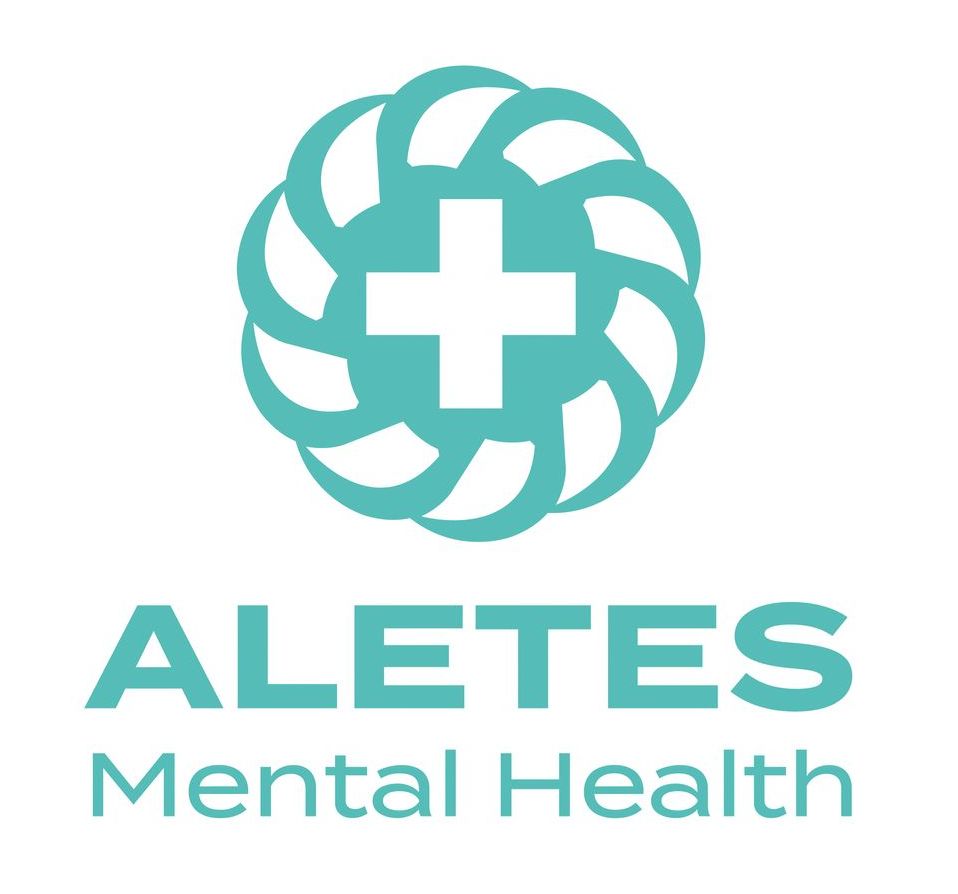Aikido for the Mind
Melania Anna Duca Canavan • 10 November 2019
Learn how to love yourself and others. Try Aikido.
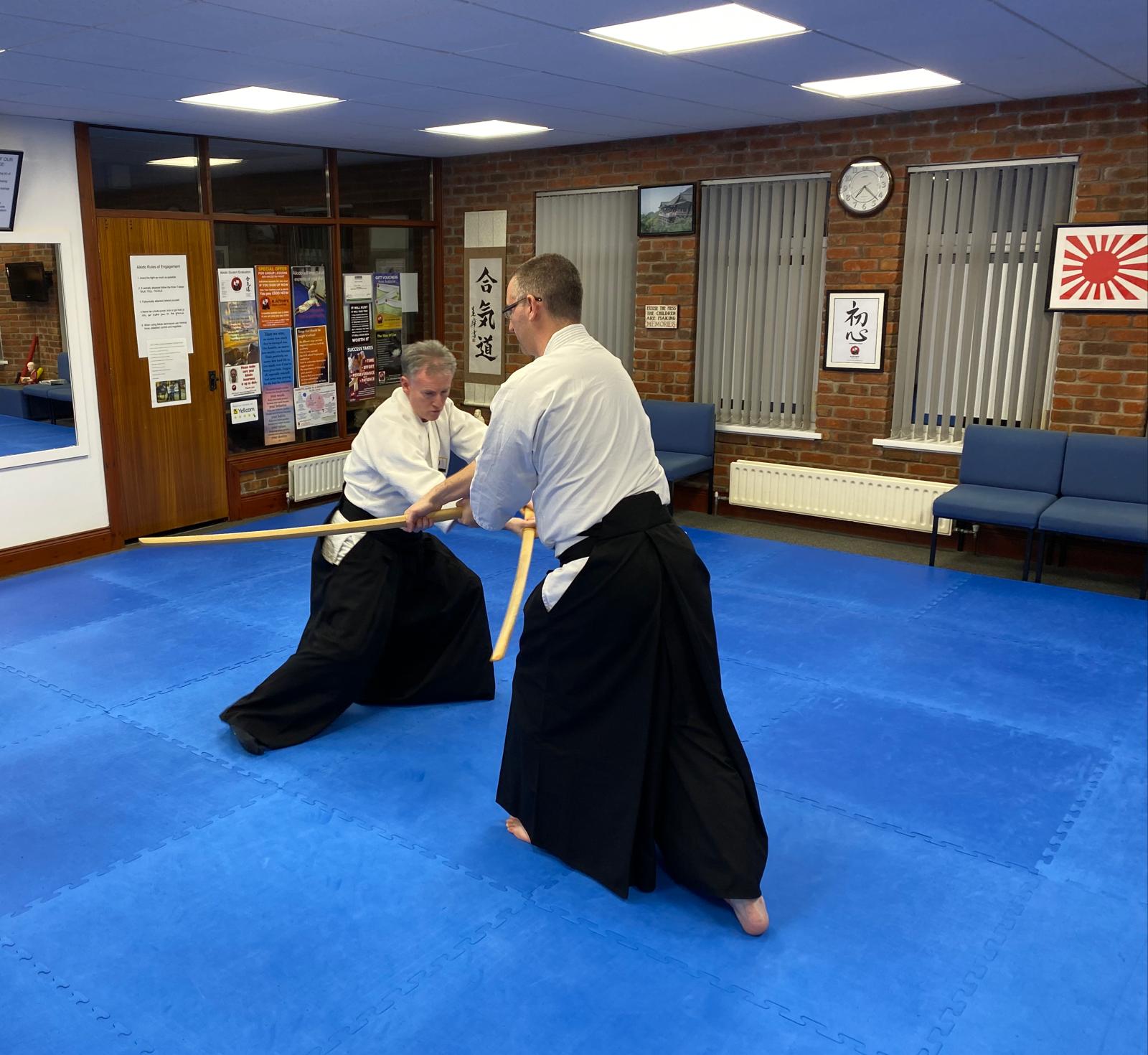
In the pictures: Martin Acton Sensei performing at Martin Acton's Aikido Institute, Dromore & John one of his best students.
I owe this post to my Sensei, Martin Acton, who I first met 3 months ago at his Institute in (Dromore), literally few steps up from the road which leads to my house, a Victorian property I fell in love with in May this year and to which I moved recently. Close to Dromore is a town called Hillsborough where my practice is now located at Orthoderm Clinic, a modern private hospital offering services of various kinds, equipped with both advanced technologies, highly qualified medical and non-medical professionals and kind and friendly staff.
Why a post on Aikido then? Well, it simply amazed me. Theoretically and practically. Martial arts have an ancient history to tell unlike Aikido which is instead quite recent in its formulation and further development. But what makes it truly interesting to me, compared to other fighting techniques, is the philosophy of “love”
which underlies and characterizes Aikido from within.
Therapy is love.
But what is love truly? Hard to say. People experience love in different ways. This happens partially because there is no real education on how to love nor how to be loved, in a way which is healthy, long-lasting and stable. As a psychotherapist I find myself working with couples experiencing relationship issues not exclusively involving sex but a far more complex and at the same time delicate concept, that of intimacy, a connection beyond words and appearance, a bond able to overcome fear and empower the authenticity
of our “Self”.
An Aikido Dojo, is more than a place, more than a school or a gym for learning and practice on how to defend or attack ourselves or the opponent. An Aikido Dojo is a Home to its aikidokas, not only students then but persons on a journey of constant discovery and self~improvement; a safe place, a temple where to lose each other
– leaving outside all of the stress, the anxieties, the worries and the duties, our identity’s shell, and find each other
– the core of our existence, our inner strength, like a pure “will”. In an Aikido Dojo we learn how to respect each other’s personal and intimate space, how to step in and out of that sphere consensually, how to always look after each other even while fighting, without imposition, without violence, no desire of supremacy. When you dominate a fight you do it because you earned it, because your superiority cannot not be recognised, it is accepted, it is welcomed, embraced, it is inspirational, even for whoever loses, to keep working, to do better, to reach a higher level of skills and preparation, to earn – again – back the right to fight again and this time succeeding. A dominion exercised with extreme love, is what we all should learn in order to be capable of successfully looking after ourselves and others.
The concept of dominion
starts with awareness, a stratified concept which would require much more space to be properly discussed than here. When we have control, of the mind over the body and of its movements in the spacetime, then we have prediction, of the events happening around us, which is possible by learning how to "speed" our thoughts – something I use to work on a lot while following my athletes during training and competitions as a Psychoanalyst for Athletic Performance. In any case, dominion comes with responsibilities, primarily that of care. Care is the first step of a long staircase leading to Love.
During the previous weeks, I have been organising with my company a few events which included Aikido demonstrations for my patients. Some chose to give it a go and purchased an Introductory Course to Aikido
straight after. The feedback I have collected from my clients were all positive and encouraging. There is a therapeutic power hidden behind the Aikido practice and more people should be introduced to its secrets.
I call them secrets because I found out that the sort of International Society
ruling on certain martial disciplines is far from interested in teaching people the way to “heal” when instead, just like the therapy that I personally offer, this should be accessible and affordable to anyone in need. That is why, I have decided to publish Martin Acton Sensei’s first book “A cure for modern society. Practical guide to learning Aikido not only for fighting”
which will be presented in Belfast soon, on November 21st on the occasion of the annual Opening Ceremony of the IBPI – International Biocentric Psychoanalysis Institute, a very innovative postgraduate school of specialization in psychotherapy which I personally direct.
The “cure” for our society is love. Learn how to love yourself and others. Try Aikido.
Prof. Dr. Melania A. Duca-Canavan, Consultant Psychotherapist
Beginner Aikidoka
For more information please visit www.martinactonaikido.com .
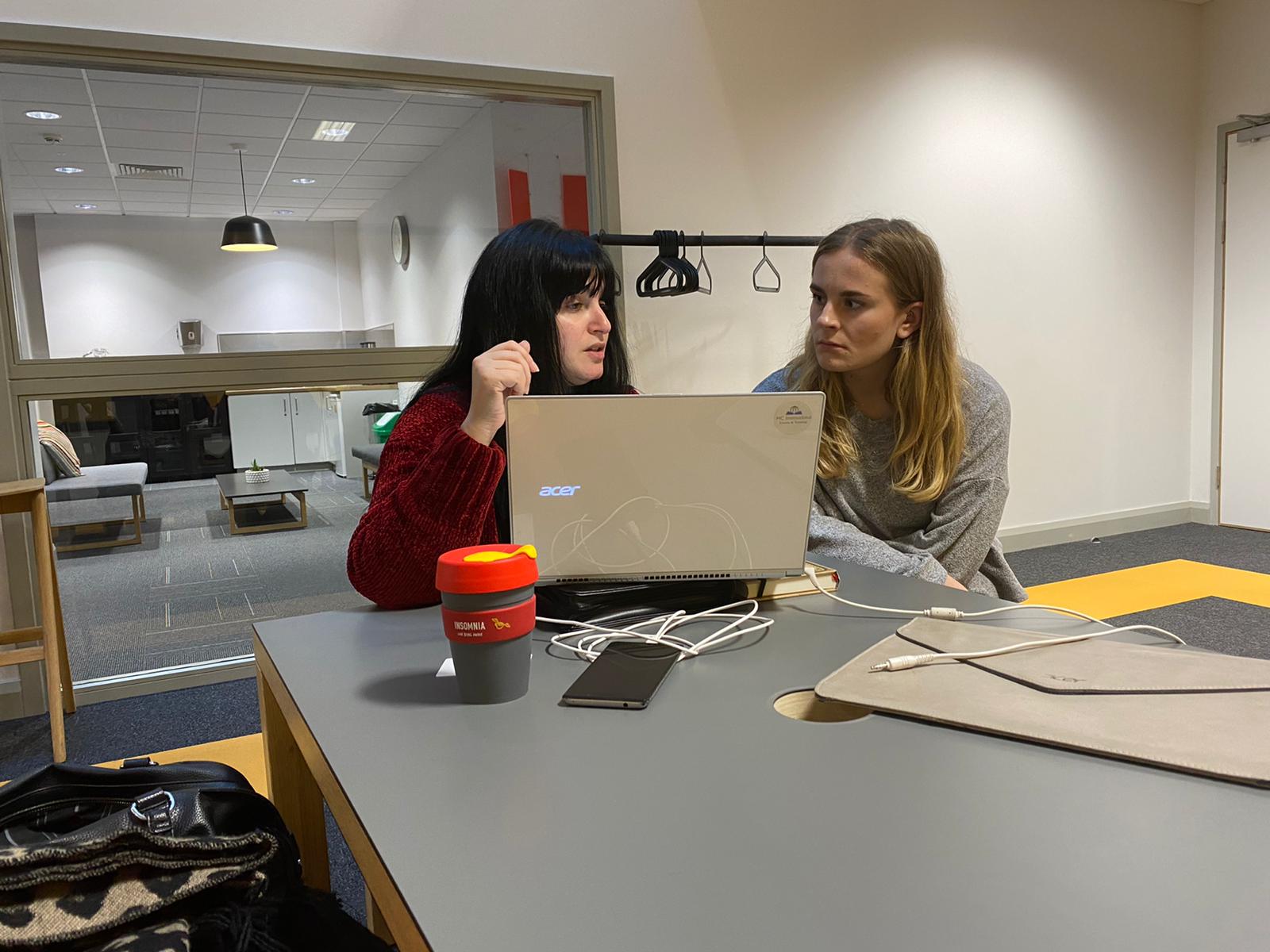
Tuesday 21st January 2020 Module: PAP© - Psychoanalysis for Athletic Performance.1 * (NCP accredited Eq. Level 7 – Diploma in Biocentric Psychoanalysis) *8 hours: 1 credit Sports object of study: combat sports: aikido, weapons** and boxing **wooden weapons, blades and weapons designed for self-defence *** I was given the opportunity to spend two weeks shadowing Dr Melania Duca-Canavan during her day-to-day life and seeing what it was like to do her job. I would highly recommend this to any student who has a work experience placement and is interested in this field of work, it’s full-on but extremely interesting and rewarding. On my first day, myself and Melania shared breakfast in her home, which is also one of her practise locations. I was felt welcomed and comfortable and began a busy day, having an introduction into Aikido and had the opportunity to sit in on a session using Biocentric Psychoanalysis led by Dr Canavan. I found this extremely interesting and Melania’s method is superb! The talent to piece together different information to gather an interpretation is very interesting and different to anything I have seen before. I was able to experience all sides of the working practise, from the administration side working with Dr Canavan’s assistant Nicola to helping with the organisation and the practise and shadowing sessions, I received a really good insight into what the job entails. Melania is available 24/7 for her clients which I have the upmost respect for and is how I believe helping mental health should be approached, it works! Melania uses many different tools to assist therapy to engage all different types of people. The organisation of the practise is very good, the use of WhatsApp to organise appointments shows the new age of approaching changing mental health in Northern Ireland. My favourite moment from my experience was visiting the Innovation Factory in Belfast. This is one of the sites Melania works at. Shadowing Dr Canavan while doing Supervision with a student was really intriguing, seeing different opinions and interpretations on how to deal with situations was enlightening. At my time in Innovation Factory I also sat in at a meeting between Dr Canavan and a charity wanting to implement mental health assistance promoted by 31 football clubs in Belfast, seeing how mental health awareness is growing and being adapted into all areas of life, including sport, is refreshing. In conclusion, I found my time with Melania really enlightening, and what makes a practise successful and would highly recommend her services. - Clare C.
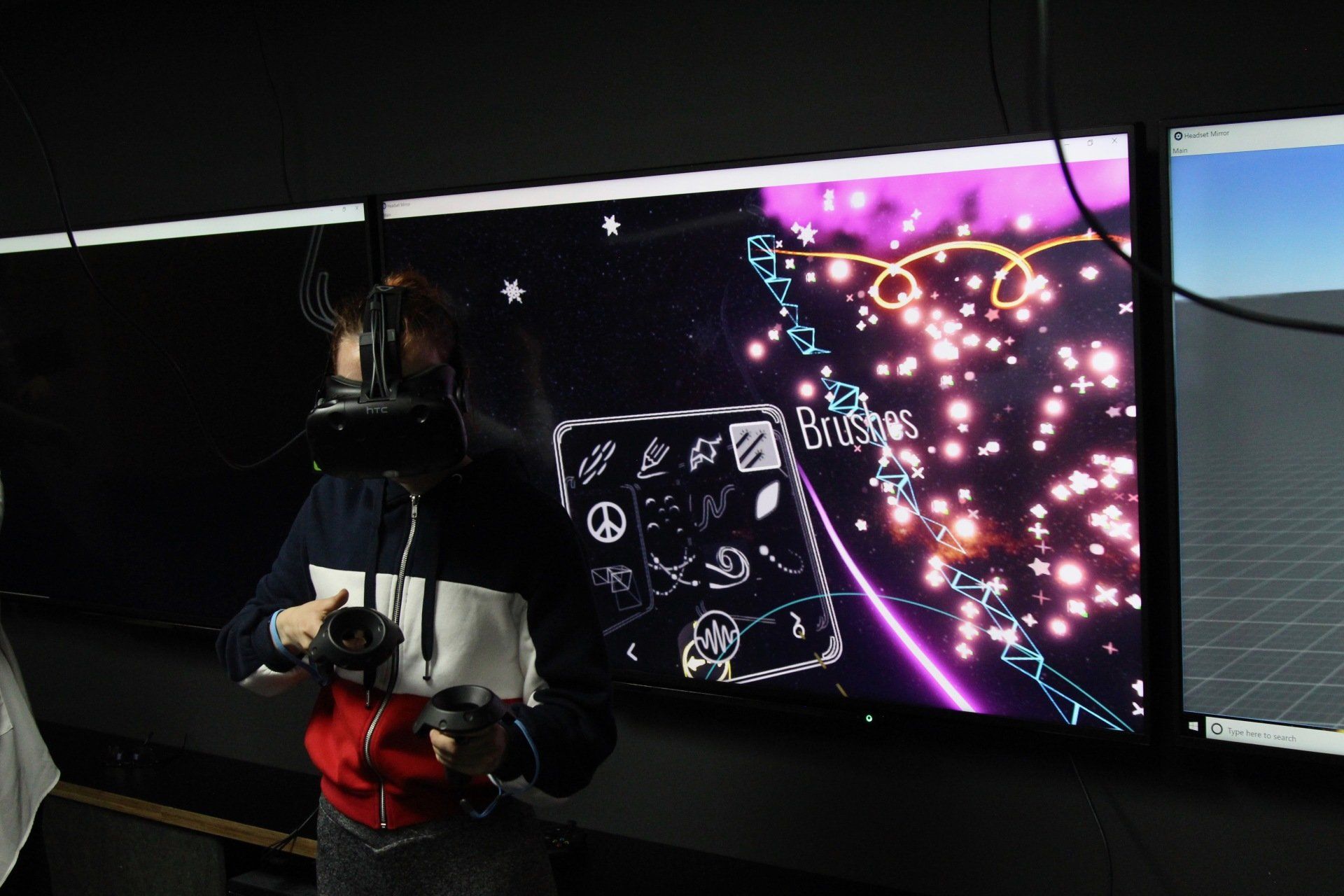
Here is a picture of the 1st group of Dr Canavan's clients participating a 2 day behavioural experiment which involved playing an Escape Room VR game. The image was made intentionally blurry to protect the privacy of some of the participants. Virtual reality is definitely one of those things which is destined to shape our future meaningfully. When people think “VR” they immediately picture themselves wearing a headset, playing one of those games we often see promoted when approaching Halloween, Christmas and any other occasion, in the “arcades”. However, Science tell us that nothing is “real” outside of our own perception . Then, if this is true, each one of us already lives in a “virtual world”, that created by our own thoughts, memories and beliefs, which rule our conduct and “role-playing” into human society, seen as a gigantic, and very elaborate “soft-ware”; “soft” because, if you think about it, its dynamics are very abstract, and it seems we inherit the ability (all of the behavioural patterns a person more or less consciously displays during their entire life span) to “act” and “in-ter-act” in and within it. Psychoanalysis and Virtual Reality Gaming have much in common. That is why I have started to believe, after pioneering in the field of VRET (VR Exposure Therapy) through the brand Psylysin , that the access to services including VR Immersion needs regulated. VR is a tool which definitely empowers the psychotherapeutic treatment, if you know how to use it, but at the same time, due to its massive potential, risks to be harmful in the “wrong hands”. Lack of awareness and basic knowledge on how the Mind works, which still seems predominant not only among the general public, but also in the training of mental health professionals, constitute themselves a very urgent issue which I do hope will be addressed soon. We at I.B.P.I , have introduced a module, alongside those on Mind functioning, specifically dedicated to the exploration of the human subconscious literally “photographed” and made it accessible for further analysis in a VR environment. I will describe an experiment here conducted with the help of AltEsc Virtual Reality Arcade Lisburn and a client of mine in her 50s, ex clothing designer with a “block” in creativity and generally in the will of pursuing anything. Too scared to try anything new, lacking both confidence and self-esteem along with symptoms of social anxiety and several side effects deriving from a collection of multiple traumas from childhood. When AltEsc moved from Lurgan to Lisburn, Christopher built a place inside the arcade where my patients could wear their headsets far from those clients who were simply enjoying themselves downstairs. I not only very much appreciated the initiative but I was actually able to work with F. , my client from above, in a way that never happened before. This time not using Tilt Brush but another software which enabled F. to move in a 3-dimensional ambient made of nature, trees, flowers and animals, at a certain point even a beach. It was relaxing; my client could literally launch some spheres into the air that once they touched the ground, they would make plants grow super-fast in front of her eyes, creating a powerful illusion of achievement . I knew my client was into gardening as a passion and that has been hard for her to grow anything recently. I also knew that flowers represented much more to her, almost a representation of herself, being neglected till it was impossible for her to "flourish". A lack of love as a nourishment in the early age, from a mother who after suffering from post-natal depression and absence of any bond with the child, also tragically died due to a sudden/lately diagnosed cancer . F. then managed, guided by my questions during a dialogue which I kept open and constant in the whole experience, lasted over 1 hour, despite what she believed to have been a 20 minute long "immersion", to draw all around herself a beautiful “prison of lilies” wide-opened, to show a diamond at their core. Simply amazing. Now, after a few months of therapy F. took a stand against a gardener employed by the government to keep the green areas among traffic tidy in those periods when it is actually forbidden by the law to alter nature in order to safeguard the local fauna especially the birds nesting in spring, and she’s now willing to join a community to spread awareness on climate change and the environmental issues which affect us all. By doing so, F. reconnected with her true-self , found the courage to say “no”, and through this affirming her identity and her needs. Therapy is a very delicate thing. It works differently, for each one of us. At the bottom, we always have an identity problem. We do not feel heard, recognised, appreciated and valued. We do not feel that we are part of something bigger, that we contribute to a cause and deliver our own precious contribution. Therefore, we get sick. Mental illness is the discomfort our " ego " perceives when our primary need as human beings cannot be met. It is a need of Love. A need of being Individuals, in the Wholeness. " With patience and gentleness Melania coaxed from me the change which I so fervently desired and continues to encourage and support me as I take the first steps. She shows you hope when you think there's none. I guarantee that whatever's troubling you she'll make you feel whole again " - F. In October 2019 I joined Orthoderm as a clinician offering a very innovative psychotherapy service which includes VRET , check me on their website .

BBC Radio Ulster - Sunday Sequence Jan. 12th, 2020 8.30am presented by Audrey Carville Thank you, Audrey, this is a very interesting topic. Back in 2018 myself and my husband Brian opened in Belfast the first and only Biocentric Psychoanalysis Institute in the world. Biocentric Psychoanalysis is a brand-new psychotherapeutic modality now recognised as independent from traditional Psychoanalysis and insured for practice in 26 different Countries. In 2019, Biocentric Psychoanalysis was welcomed into the therapeutic offer of a private hospital: Orthoderm Clinic, in Hillsborough, where my trainees and I currently assess the patients. Often people ask me what differentiates Biopsysis , short for Biocentric Psychoanalysis, from the world-known Freudian theory of the unconscious mind. In short, we do recognise the existence of a deeper psychic dimension and actually we do promote a “shared space” between individuals who then heal “outside of themselves”, in the therapeutic setting, before being carefully re-integrated into their own lives. There are plenty of other divergences between this new approach to mind investigation and the “raw” Psychoanalytic Psychotherapy, therefore I would invite whoever wants to learn more about it, to check on my practice’s website: drmelaniacanavan.co.uk or to contact me directly. Biocentric Psychoanalysis has already made a difference to hundreds of people’s lives. And all of the folders on the patients’ cases that I have been archiving during these last few years of research, makes me proud and happy to be able to share all of this with you. Q. How hard is it to break or make a habit? A. Our entire knowledge is based on habits, we get used to see events happening in a certain way. We couldn’t even survive if our mind didn’t store a huge archive of information based on inductive inferences. What I mean is that the concept of habit is engraved deeply in the human nature. Of course, habits can be at the same time created and destroyed, literally broken down – piece by piece – through for example a psychoanalytical approach to therapy. I can easily answer your question: “How hard is it to break or make a habit?” by reporting a case of mine, with a patient affected by a severe addiction to cannabis; when I say severe, I mean a person spending over £1000 a month on drug consumption. I will use a different name here to talk about my work with this client, let us say Kathryn. The practice of Psychotherapy is much different than its Science. Us practitioners we often experiment, because in the end every person is unique, every single person has their own way of thinking, and if you want to truly change their behaviour then you need to change the core of their reasoning, not only their beliefs. Kathryn, I found out valued money very much, as a product of her hard working and success as a young entrepreneur. In the chaos of her own existence, there was no space nor time, in a word “no will” to make a clear plan about the future. She has always lived “day by day”, incapable of self-caring and forgiveness toward herself as a victim of multiple traumas, abuse and violence. I simply invited Kathryn to keep track of both her own feelings and “ups and downs” – as she likes to call them – through the day, along with the amount of marijuana purchased and the related outgoing in sterling. A little, unconventional, “business game”, which she enjoyed. At the end of the month, the realisation of having burnt that much of her savings in smoking was the “hook” I needed to apply my plan, as her therapist. Kathryn has an “oral fixation”. All smokers, smoke for a reason. And that reason has roots deep down their subconscious. Smoking cessation therapy is far from easy but, like everything, if done properly, can bring excellent results. Kathryn was able to reach a sufficient level of awareness and acceptance of her own addiction that we could cut down the drug consumption initially by 50%, then 40-30-20 & 10%, in 3 months only, without any side-effects. After 6 months, and a diagnosis of emotionally unstable personality disorder, Kathryn has defeated at least one of her major problems, improved her quality of life, boosted the therapy for EUPD itself and cleared all of her debts. Q. Does breaking one habit merely lead to the making of another? A. Yes, it technically does. Replacing a bad habit with a good one is not only possible but actually what we actively seek as psychoanalysts. People are not their actions. We always have reasons why we do things. Find the reason, create an alternative, and change the habit. Behavioural therapy has a wrong concept of how the mind functions. We do not only have beliefs and corresponding behaviours. Sometimes, the beliefs didn’t even have a chance, during a person’s growth to be formed and established, therefore are missing and make the whole cognitive structure stiff and hard to work on. We are much more than an agglomerate of sensory and perceptive data. The mind is profound and very complex but absolutely readable. It is fascinating and never stops to enchant me really. Q. And in terms of our development as humans, can we really become better people Or do we remain the same people with different habits? A. What is a good person really? And what an evil one. To correctly answer this question, we should first ask ourselves what do we think human beings are made of. Humans are a miracle. My life, I consider it a journey. Like a vacation, a beautiful holiday in a beautiful place. I know, that one day I will return, to somewhere. And I don’t need Science to say that. If we all adopted this perspective, life would be much more enjoyable at least. Habits do not make a person. A person is far more than that.
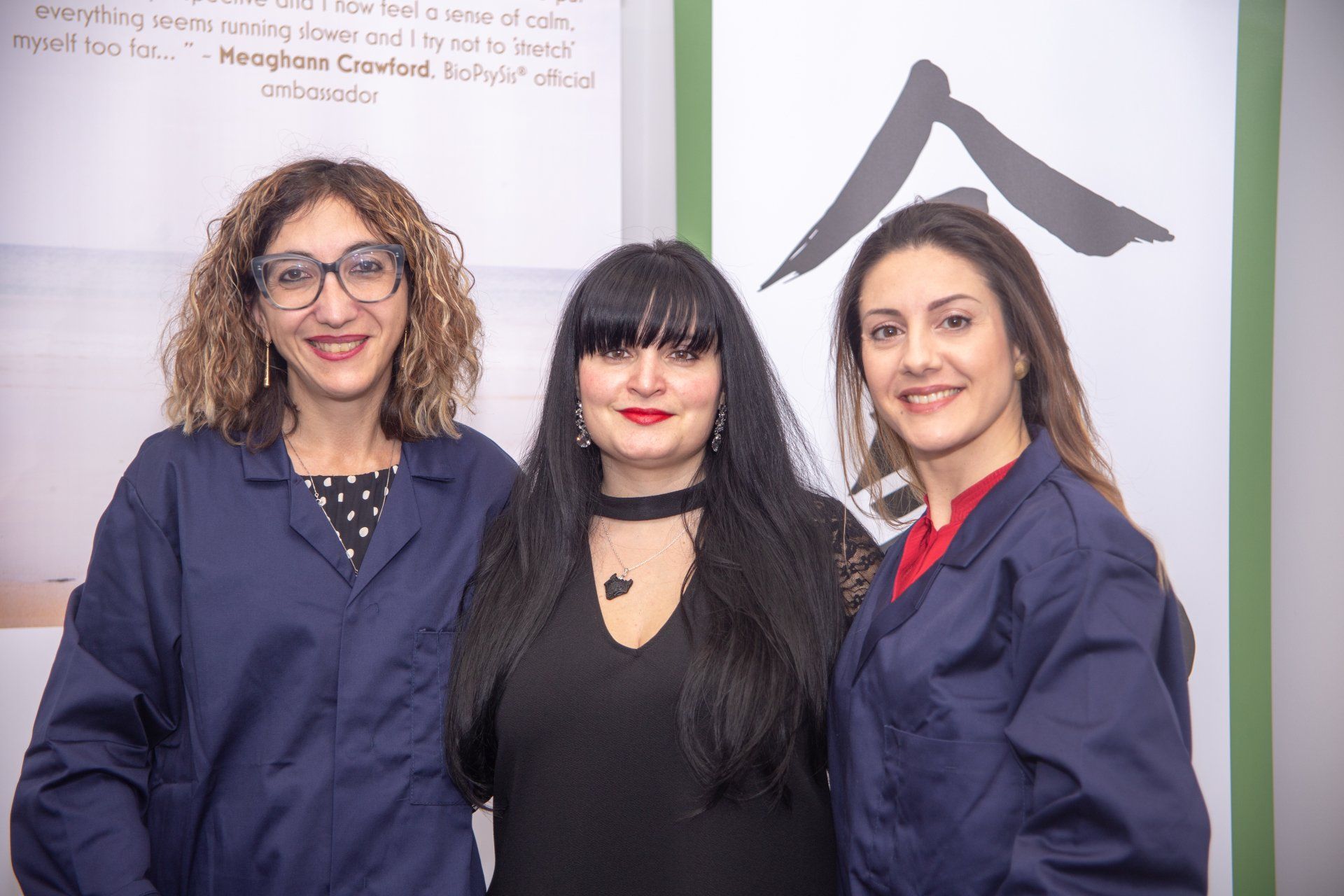
Above in the picture, an enthusiastic gifted child from Italy attending the IBPI Opening Ceremony 2019. Here is the Inaugural Speech performed by Prof. Dr. Melania Canavan at the Annual IBPI Opening held in Belfast, Innovation Factory on November 21st, 2019: Thank you Everyone for being here today. IBPI is the acronym of International Biocentric Psychoanalysis Institute , a 2-year postgraduate school of specialisation in psychotherapy accredited by the National Council of Psychotherapists which enables its graduates to work as private mental health professionals applying a brand-new therapeutic modality: Biocentric Psychoanalysis , that I personally have registered back in 2018 in 26 different Countries of the World where it is now not only recognised but also fully insured for practice, internationally, meaning that my students can export this very innovative psychotherapy service to technically anywhere on the globe. IBPI, which quickly acquired a multinational dimension, currently has 6 people enrolled who are based in 4 different Countries in both Europe and Africa, 3 operative Divisions and 1 on its way. 2 of the students are here today waiting to receive their Licence to practice as Candidates under supervision during a further year of apprenticeship. Meanwhile, we celebrate the Opening of the IBPI’s 2nd Year of Studies and I am obviously very proud of all of the accomplishments that we together have achieved so far. The mental health sector is facing one of the worst crises ever recorded in history. A too fast-growing society where the technological advancement does not keep up with the bigotry of theoretical science joined with an oppressive and genuinely obsolete capitalistic system, is making it impossible for Humanity to truly recover. My intention is not to lecture you today. However, I do believe that mental health just like psychical health is a social responsibility and if something has to be done, that something needs to be done together . We cannot keep ignoring the problem. And Northern Ireland’s problems related to the treatment of mental illness is in my eyes more than urgent, it is gigantic: Starting with GPs who are entitled to prescribe anti-depressants in this Country and they do it with the same ease they would give you an aspirin! Without proper training in mental health, and with no resources to assure you a back-up, none in terms of “monitoring” of the side effects derived by the consumption of specific drugs which in most cases – it has been proved – they are a con-cause of diabetes and other unhealthy conditions… no resources to assure you of a follow-up either, resulting in a very rough attempt to just fulfil a duty imposed: ticking another of the NHS boxes. Am I being too hard today? I am very sorry. But the truth needs spoken. I personally have patients who I have been forced to send to a private GP. I have been forced to instruct the GP with reports and notes to make sure I would have got the right psychiatric referral for the people in my care and it happened at times that the referrals were not good at all or not adequate to their needs. See, this is beyond concerning, it is gross and embarrassing. Ignorance, lack of resources and laws – yes, we miss the laws in place – these are the major problems of the United Kingdom’s mental health sector. And while we wait, we register the highest percentage of suicides occurring in the last decade, in Europe. I had patients I personally rescued from that. A man and a woman. One much younger than the other one. One of the two was once a successful dentist. One of them had me search for him along the Lagan river for hours. The other one kept me awake at night. What do we do, as a society, to be there for these people? We set up charities. Armies of untrained and very dangerous “volunteers” who help to save the world – for sure – while on the other side making the situation much worse than it would have been, if the same amount of money constantly thrown by the government into these black holes, born with the only purpose to enrich a selected elite of people, was instead invested in qualifying and employing proper professionals in the psychotherapy field. The NHS waiting list to see a psychiatrist goes up to 2 years. We have too few available and only offering too intermittent and obligatory medicated treatments with antipsychotics already out of commerce in other countries. I have a patient with a very evident OCD wrongly diagnosed with EUPD and currently under a heavy dosage of Prozac, while breastfeeding. I have seen people carrying tiny flasks of lithium, all of them totally ignoring that this sort of stuff is only given to patients when “there is nothing else that can be possibly done to save them”. When instead what they needed was to be seen, be heard, to feel not alone, to feel hope. The whole weight of the United Kingdom’s mental health crisis is on our shoulders, us private psychotherapists. And let me tell you more, psychotherapy – the way it is conducted nowadays – is totally ineffective and obsolete. Again, it is not my intention to lecture you today. But think about something: traditional psychotherapy does not involve any physical contact with clients, they are called “talking therapies” because – so far – the psychological intervention was done mainly using words. But communication is only 7% words. Do you honestly believe that talking is the cure? That “it is ok to talk” and “talking is all you need”? You are free to believe that if you want and keep feeding the charities which at night when you are feeling suicidal and phone the helpline, they tell you to make yourself a cup of tea and eat some cookies! But no, it does not work that way. If it was that way, charities could decrease the percentages of suicides, violence, victims of traumas and more, which are instead literally baking in this enormous oven called Medieval Ages of Psychological Science. Biocentric Psychoanalysis is different. It applies an integrative approach both to mind investigation and the resolution of its problems. Psychoanalyzing is like sewing, we technically work on the concept of identity, to reinforce the edges of those holes created by traumas in our cognitive structure and possibly fill them with a new tissue made of thoughts and new connections. It is much more than talking. It is architecting. One of the most successful tools that I have been using so far to operate a manipulation of the psyche of my clients without necessarily relying on physical contact nor on any other instrument of the controversial hypnosis is Virtual Reality, gently provided by AltEsc in Lisburn where we recently opened a new laboratory, the first and only proper VR Exposure Therapy lab in Northern Ireland . Something else that definitely distinguishes us from traditional psychotherapy is that we do not follow protocols, we work experimentally, dealing with what is in front of us, and this because every patient is unique and different and diagnosis are just reductive labels useful only for drugs’ prescriptions really. Every mind codifies information in a very personal way and still minds can connect to each other through a much simpler and powerful universal code and this exemplifies the miracle of existence itself. Us therapists, we are basically code analysers. Therapy is first of all decoding, and coding. I am sure nobody talked to you this way before, about mental health. You are more used to hear “IT IS OK NOT TO BE OK” all the time! And again, my answer is NO, IT IS NOT OK NOT TO BE OK if it stays like that . Which is exactly what the business of charities less or more intentionally is currently feeding and growing. While a first consultation with a psychiatrist at a private clinic is priced £230 with a waiting list of 3 weeks! Why do I tell you all this? Well, because these are only a few of the reasons which pushed us toward developing the IBPI as a project! We need trained professionals; we need affordable and effective therapy which is able to solve problems not necessarily fast but once and for all. Because solving problems temporarily is not solving them, at all. For example, one of the first thing I have changed when I thought about setting up a school qualifying in psychotherapy is DBS checking my students before even enrolling them. Know that in Northern Ireland you can technically be a paedophile and easily access certain mechanisms which enable you to work with children as a private mental health professional fully licenced and insured for practice. It happened many times in the past and newspapers are full of news related to similar issues. I am being very hard in my words today but I sincerely do not feel that I should apologize for it. I love this Country as much as you do and I do believe that if we fight all together, we will make it a better place, for us, for our children and the future generations.

Have you ever heard about cosplay (costume play) before? Cosplay is a very creative and challenging activity in which amateur and professional “cosplayers” engage in, several times a year, a phenomenon both artistic and social, happening everywhere and even more frequently nowadays in the world. Basically, people wear costumes, mostly custom made – here is the challenge! – to represent a particular character from a cartoon, such as a Japanese “anime”, a comic book or “manga”, or even a videogame. Cosplay conventions are usually very populated events where performers meet, have pictures taken, compete, network, bond, have fun, play with their image, build up confidence and much more. But, what Freud would say about cosplay? Actually, not much. In any case, nothing relevant to truly understand modern society’s very complex phenomena. Why? Well, traditional psychoanalysis has proven on various occasions its deep inadequacy to go beyond the individualistic perspective. This is not the era of rebellion anymore, of selfishness and isolation. We have already gone through all that and collected disappointment, anger and fear. Today, we wish to belong. We want to be part of something bigger, something greater, something durable, stable and grounded, with a purpose, a long term vision, an ideological garden where we can plant memories and dreams, which will flourish and stay beautiful, even after we have left this world. Psychology keeps failing because it does not understand what people need, in 2019, not back in the after-war years. The deafness of psychological disciplines toward humanity has its roots in the grounds of University’s intellectual crisis. And while science progresses through constant experimentation, braveness and adventurous spirit, psychology keeps applying sterile protocols and writing manuals and desiccates in the diatribes across sectors and professional bodies, in the illusion to finally deserve to be called “scientific”, earn more money and privileges. A very sad scenario, I know. But someone must call it out. And I have personally reached a point where I have both knowledge and competence, personal and clinical experience, to say: humans first! Being human does not mean “top of food chain”. According to recent studies we would rank quite lower than expected, in any case. It means having received a very precious gift: the chance to look after and take care of the outstanding beauty of Nature. Not shaping bonsai indoors but creating an alliance of people around the globe who think and act together, able to connect at a deeper level than we are used to. Technology ? It is not a monster, if we know how to use it. Back to cosplay, wearing a costume other people recognise and admire because it recalls to their minds not only the character but the related memories and feelings they have experienced whenever they watched that cartoon, movie, played that videogame, or read that comic book etc., it is much more than simply acting: it is meta-communication , it is talking to each other in emotional codes . Codifying communication is a very recent thing. Think about the emoji (previous emoticons) people began applying several years ago using punctuation, further transformed into yellow faces by WhatsApp! Cosplayers are usually introverted people who find socialising much easier when dressed as someone else, a fictional character. Not a real person. A human-looking (and at times not even!) sort of entity, which represents certain values, beliefs and behaves in specific ways. Cosplayers codify human interaction and make it possible, for themselves in the first place, expressing emotions they wouldn’t in a different context, delivering a message they keep burying under a very stratified “ self ”. Cosplay is therapeutic. I would personally classify it as “ art therapy ”. But probably we do not really have a name to define what truly happens during these events. And I believe it should stay this way, after all. There is a “dark side” to cosplay, of course. Some people take it to the extreme. They waste way too much money trying to achieve a perfect representation of the character they intend to “bring to life”. Here problems start appearing. Personality dissociation is one of those. I will write more about the “side effects” of cosplay in the future, so stay tuned! Meanwhile, here you will find a gallery of photographs of Emily B. , one of my most creative and “glitzy” clients who has agreed to have them published in my blog. Emily’s personal story is incredible. She’s one of the most resilient women I have ever met. So open minded and inspiring, with a true talent for modelling – as you can see! "Melania has greatly helped me. I feel like I am better able to cope with things that occur in everyday life, and I feel more capable, confident and ready to work through difficult times. I would recommend her services to anyone." - Emily B.
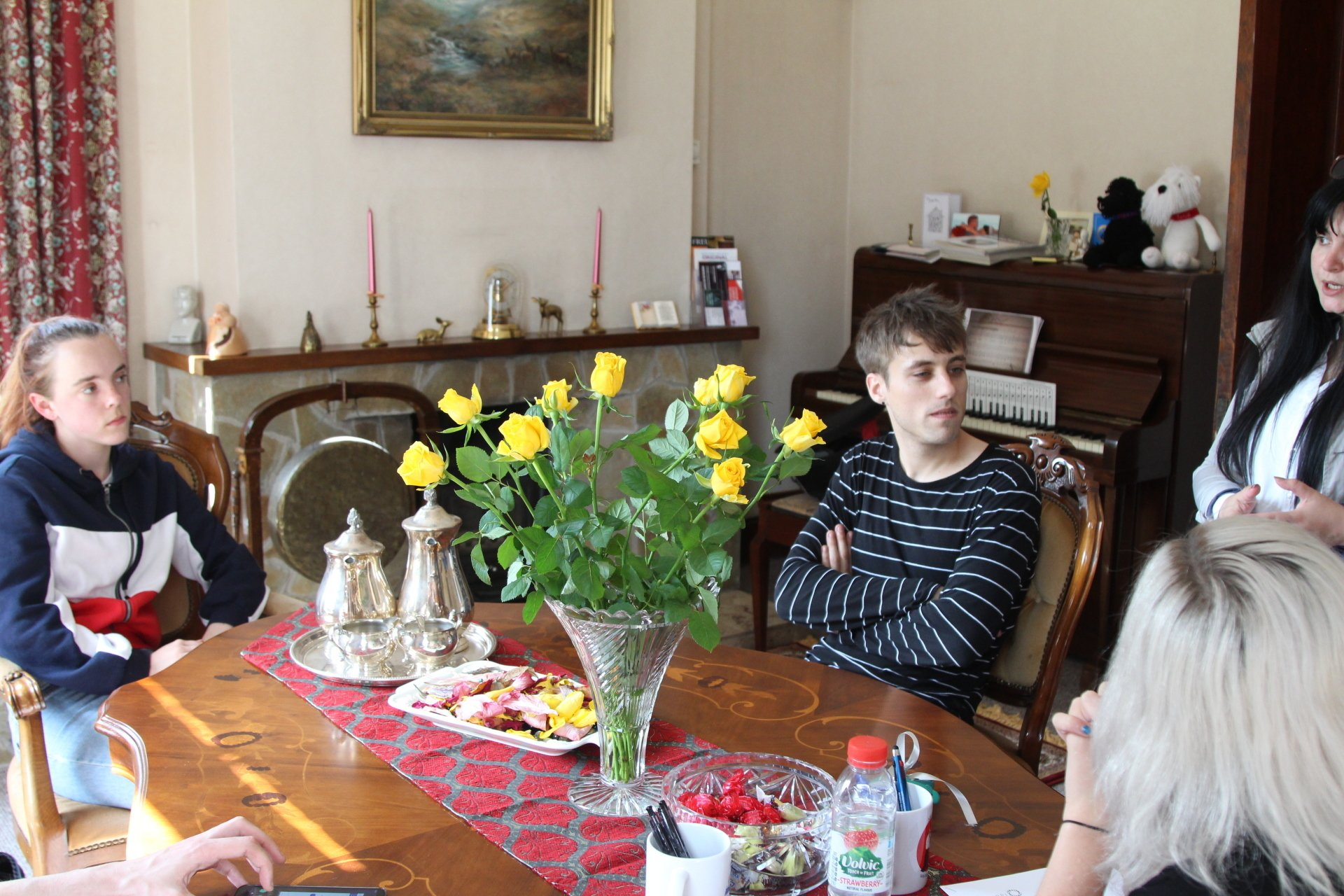
Social therapy is a positive, relational psychotherapy with special focus on emotional development and group creativity. In the pictures taken by Matthew McCracken some of the project’s volunteers and myself are featured during the briefing, task assignment and feedback collection phases. A BEHAVIOURAL EXPERIMENT From August 12th to the 18th my company and I have been hosting a very special event: a full week of activities both indoor and outdoor involving a group of young patients of mine selected through personality testing . A behavioural experiment which aimed to demonstrate how powerful social therapy can be if applied to certain cases previously treated for a period of at least three months through psychoanalytic psychotherapy . All attendees had a few traits in common and shared traumatic experiences of similar nature. They were not aware of it and interacted with each other in a safe, non-judgemental environment that allowed them to socialize, push their boundaries and improve their confidence. The whole experience was structured to be highly stimulating, with various inputs offered (such as the practice of new sports, art, music, virtual reality and group therapy) constant monitoring and at the same time programmed “breaks” during the day to promote a more natural dialogue than the usual feedback collection. Specifically, I wanted them to share a moment of “ convivium ” in the shape of an afternoon tea organised in the same therapy room that most of them have been working in with myself during the previous weeks. The same room which often contained them, their tears, frustration and all negative feelings. I wanted them to comment and give their own creative interpretation of some of the paintings I have in the same room. Discuss the intercontinental menu I carefully put together for them to get to know a bit of my own Italian culture. I invited the partners of my patients and three of them actually showed up, participated and integrated perfectly into the group, improving their relationship communication which has been empowered by this suddenly acquired “public dimension”. I made sure I could talk to them all, both individually and in a group, encouraging those who struggled to talk with everyone to ask the questions they did not have the chance to, creating the “right moment” for this to happen, without the “anxiety” and the “blocks” usually deriving from “shyness”, sense of inadequacy, fear of rejection and introversion. An outcome of this experience which I truly consider amazing is the consequent “boost” of their individual therapies and the progress they all have made in the follow-up sessions. Some became friends even, exchanged contacts and organised meetings out of my room, a “side effect” considered “normal” for people who enjoyed themselves and then decided to see each other again. A bit uncommon instead for those who experienced a serious struggle both with empathy (being tested and certified as below certain standards) and then definitely improved, and socialising or just starting a conversation, sharing personal information or keeping eye contact or managing recurrent panic attacks when in crowds! My youngest patient left a review two days ago referring to the “fun had in Braemar House" as something which opened her eyes on mental health, which she now perceives as something way more important, a value to share with other people. She started campaigning for mental health awareness feeling proud of her “braveness” and willing to contribute to produce a change not only for herself but for those she loves and will encounter on her path. Again, simply a miracle for a person with a long history of self-harming on her shoulders. IDENTITY AND VULNERABILITY The truth is that human beings are vulnerable. But they do not like it. The reason is that too often being vulnerable is not associated with a positive feeling. Vulnerabilis is a Latin adjective which indicates the state of being sensitive and in a way fragile that if threatened the subject can be harmed or damaged. However this negative connotation of the word vulnerable is only potential. Something sensitive is way more receptive than something which is not, and often fragile things are the most precious. Again, it is all a question of perspectives. I was reading today a brilliant article published by a colleague of mine from Washington which I invite you to look at on GoodTherapy.org. His post was about love: the exceptional healing power of unconditional love, as theorized by Sigmund Freud. Abusive or neglecting parenthood can cause identity issues, delaying and hindering its correct healthy development during a child’s growth. Mental illness is 99% rooted in “ the Identity problem ”. Several further traumas, such as domestic violence, sexual violence (assault, rape and abuse), sexual objectification, incest and bullying, only aggravate the clinical picture, layering the initial discomfort and emotional disturbance into something way more complex and at a certain point starting to function dynamically like a system on its own. Which then needs analysed, “mapped” and destructured. And this operation can take several years to be completed. Family estrangement is then a direct consequence. ACCEPTANCE AND LOVE All of my patients have been victims of at least one combination of the traumas listed above including the abusive/neglectful parenting. We then find ourselves in front of a complex diagnosis where more than one condition intersects. What to do in these cases? I personally lean toward a systemic approach. I have a passion for patterns due to my synaesthesia. I often like to picture psychoanalysis like sewing. A few weeks ago I was asked by a friend of mine to write something about it which you can check online if you wish to know more. During this Mental Health Awareness Week that just ended and that I spent in the company of 10 of my clients who volunteered for the behavioural study and even give me permission to release their pictures, what I have been doing is nothing more than “sewing” really: building a surrogate of a family where acceptance and love in its purest form was able to flow, where they felt equal and “lifted” from the burden of “diversity” and “loneliness”. I am very pleased with the results obtained so far and I want to take the occasion to thank also all of the providers and facilities we partnered with in this journey and this includes Martin Acton’s Aikido Institute (Dromore), Varcon Gaming (Dromore) and Mount Pleasant Equestrian Centre (Castlewellan).
